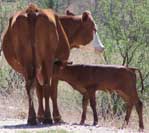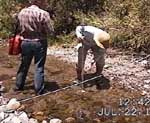





The Saguaro-Juniper Covenant: A Bill of Rights for Human Occupancy and the Private Governance of Wildlands
This Bill of Rights consists of understandings to which the covenanting parties have agreed by consensus, formulated as a real estate covenant to be attached to the land deeds of the Saguaro-Juniper Corporation and associated covenanting parties. As our corporate understanding changes, this formulation may be changed by the consent of the covenanting parties, as recorded in amendments to the original real estate covenant. One-time or short-term exceptions to specifics may be granted by the consent of a duly-constituted meeting of the covenanting parties. Exceptions taken to meet emergencies are to be explained to and evaluated by a meeting of the covenanting parties. The Saguaro-Juniper Covenant's preamble and principles establish a common ground for group discussion and deliberation. They are to function primarily as queries that guide decision making, not as conclusions that override deliberations.
Preamble: In acquiring private governance of land, we agree to cherish its earth, waters, plants, and animals in a way that promotes the health, stability, and diversity of the whole community. This entails attentive stillness to meet and know the land as an active presence. It entails study, observation, shared reflection, and cumulative corporate experience to increase and bequeath our understanding of ecosystem health, stability, and diversity. It entails symbiotic naturalization into the land community - a communion of actual nurture and shelter. As elaborated by these entailments, fully accountable governance - stewardship - is the distinctively human way of bonding into one society with all who share in the land's life, which is the foundation for instituting a biocentric ethic among humankind.
Principles:
1. The land has a right to be free of human activity that accelerates erosion.
2. Native plants and animals on the land have a right to life with a minimum of human disturbance.
3. The land has the right to evolve its own character from its own elements without scarring from construction or the importation of foreign objects dominating the scene.
4. The land has a pre-eminent right to the preservation of its unique and or rare constituents and features.
5. The land, its waters, rock, and minerals, its plants and animals, and their fruits and harvest have a right never to be rented, sold, extracted, or exported as mere commodities.
Specifics for Section 7:
1. No roads are to be constructed.
2. No off-road motorized travel is authorized.
3. Chainsaws, engine-driven generators, and other mechanical noise-makers are prohibited.
4. There is to be no access for electric lines of any kind.
5. Hunting, shooting, trapping, and firearms are prohibited.
6. No garden or orchard pesticides are to be used.
7. Notice and discussion are to precede any construction, any development of a garden site, and any destruction of perennial plants.
8. Tents are preferred; trailers, mobile homes, and manufactured houses or storage sheds are prohibited; any construction will be predominantly with native materials.
9. Dogs, cats, and other pets (excluding grazing animals) must be enclosed or on a leash.
10. All inorganic garbage such as metal cans, glass bottles, and plastics shall be carried off for disposal.

Back to SJ home